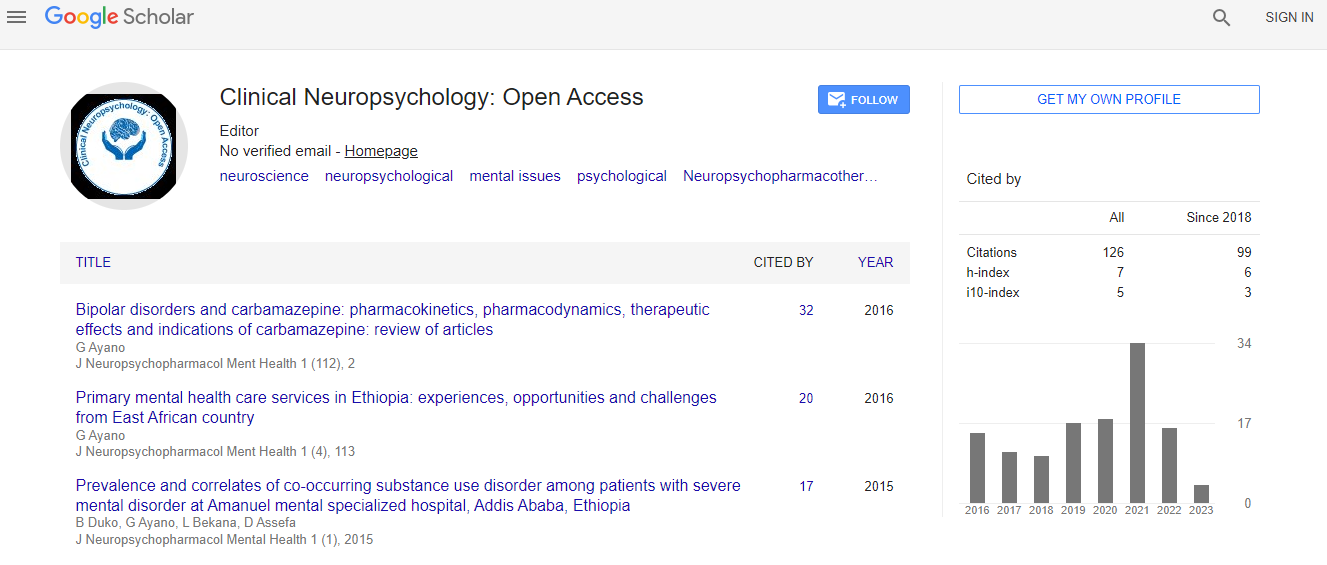Our Group organises 3000+ Global Conferenceseries Events every year across USA, Europe & Asia with support from 1000 more scientific Societies and Publishes 700+ Open Access Journals which contains over 50000 eminent personalities, reputed scientists as editorial board members.
Open Access Journals gaining more Readers and Citations
700 Journals and 15,000,000 Readers Each Journal is getting 25,000+ Readers
Google Scholar citation report
Citations : 141
Clinical Neuropsychology: Open Access received 141 citations as per Google Scholar report
Indexed In
- Google Scholar
- RefSeek
- Hamdard University
- EBSCO A-Z
- OCLC- WorldCat
Useful Links
Recommended Journals
Related Subjects
Share This Page
Executive function deficits in neurodevelopmental disorders
8th Global Experts Meeting on Advances in Neurology and Neuropsychiatry
Pawan Rajpal
10 Harley Street London, UK
Keynote: ClinNeuropsychol
Abstract
Neurodevelopmental Disorders (NDD) including autism/Asperger’s (ASD) and Attention Deficit Hyperactivity Disorder (ADHD) has deficits described either in social communication/interaction/imagination or in attention/concentration/ hyperactivity/impulsivity. There is significant co morbidity, from 30% to 50%. These are often associated with Executive Function Deficits (EFD). EFD is a term used to describe cognitive processes that help individual regulate, control and manage outthoughts and actions. It includes planning, working memory, attention, problem solving, verbal reasoning, inhibition, cognitive flexibility, initiation of actions and monitoring of actions. Though the EFD are not a part of diagnostic criteria, it is these deficits that cause the most morbidity in day-to-day living. The lack of behavior flexibility, emotional control and self-monitoring is the basis of presentation in people seen with the diagnosis of autism/asperger. Environment adaptations advised for ASD of routine, structure and predictability are not focused on supporting the EFDs that a person is struggling with. They do not reduce the morbidity caused in able children/adults with diagnosis of ASD. ADHD presents with difficulties in prioritizing, impulse control, being emotional with mood swings, poor time keeping, poor ability for task initialization, ability to shift attention and organization. Treatment modalities (medications like stimulants and CBT) used in ADHD does not improve EFDs and they require specific adaptations in the environment. Just focusing on core deficits in ASD or ADHD does not enhance the quality of life or the outcomes. Identifying the exact set of EFDs will allow for developing specific adaptations to enhance the quality of life for children, students and adults.Biography
Pawan Rajpal has completed his bachelor’s in medicine from Mumbai, India followed by a Postgraduate Diploma in Psychological Medicine. He was further trained in London finishing his Membership of the Royal College of Psychiatrists and further Specialized in Psychiatry of Intellectual Disability. He has been practicing for the last decade in prestigious Harley Street in London and at Priory group, working with people with neurodevelopmental disorders, specializing in diagnosing and managing complex cases.
E-mail: dr.pawan.rajpal@googlemail.com

 Spanish
Spanish  Chinese
Chinese  Russian
Russian  German
German  French
French  Japanese
Japanese  Portuguese
Portuguese  Hindi
Hindi 